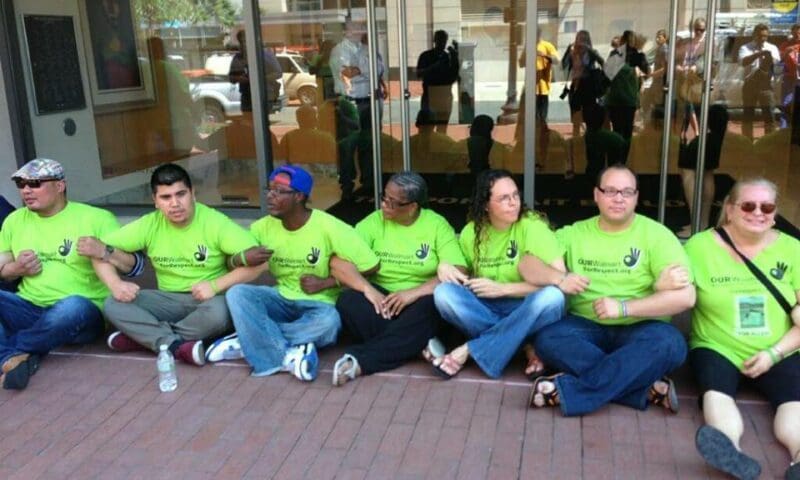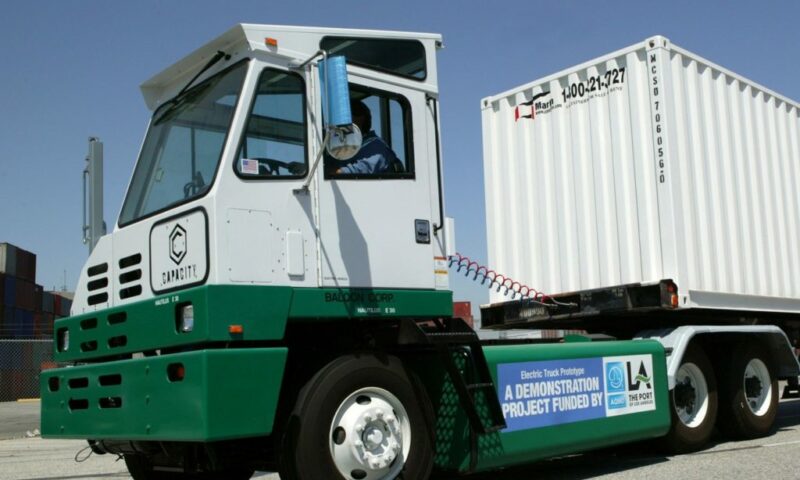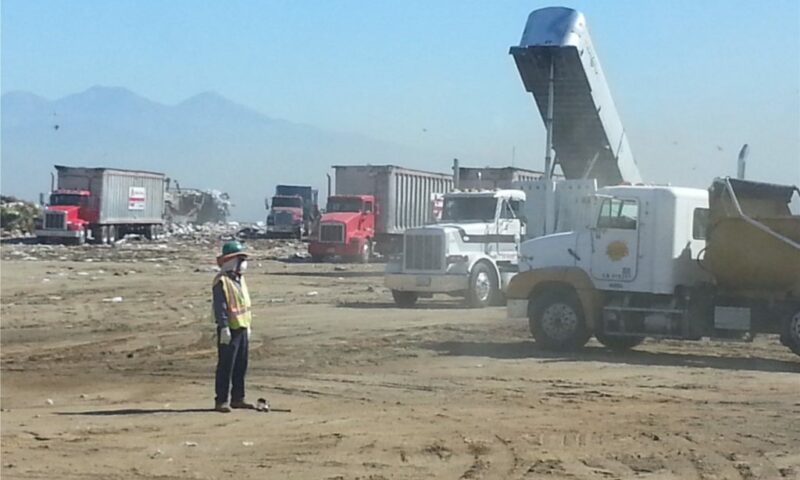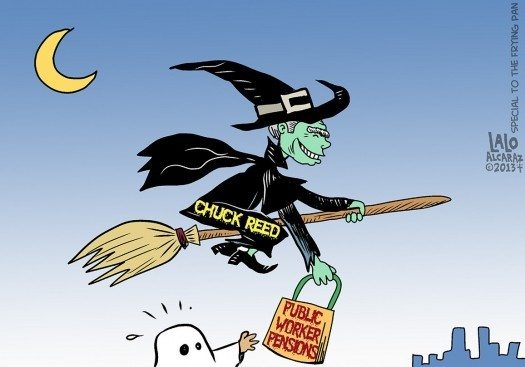LATEST NEWS


How will the 2016 election be framed? What will be America’s choice?
If the coverage of last week’s two big winners offers a guide, the choice will be between “pragmatism” and “ideology.”
The Washington Post called Chris Christie’s huge gubernatorial victory a “clear signal in favor of pragmatic, as opposed to ideological, governance.”
But the mainstream media used a different adjective to describe Bill de Blasio, last week’s other landslide victor. The New York Times, for example, wrote of “the rise of the left-leaning Mr. de Blasio.”
Again and again, Christie is described as the pragmatist; De Blasio, the lefty.
But these appellations ignore what’s happening to an America in which almost all the economic gains are going to the richest 1 percent, median household incomes continues to drop and the number of Americans in poverty continues to rise.


“Thank you for your service.”
It’s a line we hear and say a lot around Veteran’s Day, especially in California, home to 1.8 million veterans, more than in any other state.
But if we really want to show gratitude for our veterans, then we need to do more than utter a simple “thank you.” We need to help these brave heroes find a middle-class life when they return from serving our country.
According to the Department of Veterans Affairs annual survey of veterans, jobs are the biggest concern for our returning veterans and for good reason — the unemployment rate for veterans of recent conflicts is an unacceptable 10 percent and 1.5 million young veterans – many with families to support — currently live under the poverty line.
It hasn’t always been like this. According to Nick Berardino, Vietnam Veteran and General Manager of the Orange County Employees Association:
“When we came back from Vietnam,
» Read more about: Labor Initiative to Help Struggling Veterans »


As every resident of the Southland must know by now, this month marks the centennial of the Los Angeles Aqueduct. When, in 1913, the valves were first turned and water rushed down the last hillside between the Eastern Sierra and the San Fernando Valley, William Mulholland, the brilliant self-taught engineer who guided the project, and whose career would end when the St. Francis Dam collapsed, famously said, “There it is. Take it.”
A small group of anonymous but rich men already had. And they will again, if they can.
A hundred years ago, these self-styled “civic leaders” cooked up a plan that began by stealing all the water that flowed down the Owens Valley on the eastern side of the Sierra Nevada. If you’ve seen Chinatown you know this plot. A faked water-shortage scare stampeded L.A. voters into supporting a bond measure that provided funds to purchase ranch and farm properties in the Owens Valley,


More than any other public policy issue, health care is very personal. So it is not surprising that personal stories are a central battleground for the public perception of the Affordable Care Act. And it is increasingly clear that this battle will be fought through the prisms of class and race.
The Affordable Care Act (ACA) would not have become law if it were not for the willingness of survivors of the nation’s health care mess – people who had lost loved ones, fought to get care after an insurance company denial, faced crippling medical costs – to tell their stories to members of Congress and the press. Many members of Congress voted for the bill, despite the political risk, because they were moved by personal encounters with constituents with compelling stories. Many of the most effective spokespeople during the legislative battle over the law were people whose lives and livelihoods had been threatened by our defective health coverage system.
» Read more about: Halloween’s Over But Media’s Obama-scare Stories Persist »


The motorcade of JFK commemorative TV programs began this week and will continue through the half-century anniversary on November 22. The 35th president’s reputation has run the arc from martyr to cultural piñata and, if JFK: A President Betrayed is any indication, is returning to sainthood.
Like just about anything open to historical interpretation, Kennedy’s thousand days in office and his assassination provide grist for the relentless, endless shouting matches that have replaced the American conversation about our national identity. In fact, I would say that the culture wars did not start with the Pill, the Beatles, Lenny Bruce, Timothy Leary or Mario Savio – they began the minute John F. Kennedy was pronounced dead.
There was some minor confirmation of this today in the online reaction to the review, by Los Angeles Times TV critic Robert Lloyd, of the National Geographic Channel’s Killing Kennedy,


I have been practicing the first two
lines of a poem by Chung Ling:
“I make fast my white barge
to the bank of the brimming stream.”
One of my students wrote it out for me
phonetically. I want to say these lines
to the old Chines guys I swim
with every afternoon at the Y.
I think they would enjoy it. I think
they would like me. Today there is
no one in the pool but us, and we
are all hanging onto the sides.
I point to the placid water and recite.
They are stunned, and then Mr. Chu
starts to weep. His friends help him
out. They disappear through the blue
door. Later there is a note on my locker,
written on a paper towel,


During NPR’s Morning Edition, broadcast on Southern California’s public radio station KCRW, you’ll hear an underwriter spot for “Labor Lawyers” Fisher & Phillips.
Turns out Fisher & Phillips represents employers and it’s not a benign management firm.
Here’s Fisher & Phillips describing on its website how it helped a manufacturing plant during a labor dispute with the Machinists union:
[O]ur firm provided advice to the company on how to weather the strike including the hiring of permanent replacements for the approximately 100 employees . . . Our attorneys also advised our client regarding the legal and practical issues involved in removing the union . . . As a result, today our client’s plant is union-free and more productive than before the strike.
A national firm, Fisher & Phillips’ L.A. partner Lonnie Giamela is referenced in the promo.


Randy Shaw’s The Activist’s Handbook is a book with legs. First published in the early 1990s, it has now been updated as a guide to “winning social change” in the new millennium. If you’re a long distance runner in any U.S. social movement—or trying to figure out how to become one—this is the training manual for your team.
The appearance of a second edition has given the California-based author and community organizer a chance to expand upon the case studies he utilized in the initial edition, adding new material about protest activity not yet stirring two decades ago. The eclectic mix of older and new material makes the information and advice that Shaw dispenses even more useful to organizers of all types. His latest Handbook examines “new strategies, tactics, issues and grassroots campaigns and revisits whether activists have learned from past mistakes.”
The ground covered includes fights for better housing and tenant rights,


On Tuesday, Bill de Blasio won a landslide victory to become the mayor of New York City, voters in New Jersey and Seatac, Washington supported minimum wage hikes and the Illinois legislature voted to legalize same-sex marriage. These are among the progressive victories that swept across the country.
Despite a few setbacks, progressives had much to cheer about, sensing that the tide is turning against the unholy alliance of big business, the Tea Party and the religious right. Growing protests — such as the “Moral Monday” movement in North Carolina, militant immigrant rights activism, battles to protect women’s health clinics from state budget cuts, strikes by low-wage workers, civil disobedience actions to challenge voter suppression and student campaigns against global energy corporations — reflect a burgeoning progressive movement bubbling up from below the surface that is beginning to have an impact on elections.
By far the most impressive symbol of this rising tide is de Blasio’s landslide win,
» Read more about: The Elections: Ebb Tide for the Tea Party? »


So how to explain this paradox?
As of November 1 more than 47 million Americans have lost some or all of their food stamp benefits. House Republicans are pushing for further cuts. If the sequester isn’t stopped everything else poor and working-class Americans depend on will be further squeezed.
We’re not talking about a small sliver of America here. Half of all children get food stamps at some point during their childhood. Half of all adults get them sometime between ages 18 and 65. Many employers – including the nation’s largest, Walmart – now pay so little that food stamps are necessary in order to keep food on the family table and other forms of assistance are required to keep a roof overhead.
The larger reality is that most Americans are still living in the Great Recession. Median household income continues to drop. In last week’s Washington Post-ABC poll,
» Read more about: Congress: Safety Nets Are Made for Shredding »


Apparently Walmart, the country’s largest — and, some say, stingiest — private employer thought its troubles at the new Chinatown grocery center were over once it opened for business in September. That, however, was corporate wishful thinking in serious need of a cleanup in aisle three. Today, November 7, the community coalition that opposed Walmart’s original entry into the historic neighborhood will be demonstrating against the mega-chain’s continued abuse of its low-paid employees. The event will culminate with the arrest of 100 men and women in front of the store.
Their immediate goal is to draw attention to Walmart’s strategy of maximizing profits by scheduling its workers for the minimum number of hours possible and by encouraging them to apply for food stamps and other tax-funded programs to supplement their meager paychecks. (Not to mention firing dissident workers.) But organizers also hope to build momentum for nationwide protests against Walmart scheduled to take place in three weeks.
» Read more about: Walmart Civil Disobedience Planned for November 7 »


Seven years ago, the Coalition for Clean and Safe Ports came together with one simple goal: to fix the broken port trucking system. For too long, port trucking had been a case study in market failure: The trucks spewed emissions that killed three area residents each week; a fragmented, inefficient market led to delays for cargo interests; and truck drivers had among the lousiest jobs around. So we came together – environmentalists, faith leaders, immigrant rights groups, union organizers and others – and worked with the Port of Los Angeles to develop what became the award-winning Clean Truck Program (CTP).
We’ve made great strides toward some of our goals. The entire fleet of about 12,000 trucks has turned over. No more 60-year-old trucks in service (no joke!). All trucks have cleaner engines and truck emissions have decreased an estimated 80 to 90 percent. Residents around the port – and along major trade freeways like the 710 – are breathing better and we’re making a real dent in children’s asthma,


Yesterday’s Los Angeles Times brought a behind the scenes account of the genius of San Diego City Attorney Jan Goldsmith and his brilliant maneuvers to oust former Mayor Bob Filner.
I’m not sure what led to the piece, but in it we learn that Goldsmith—a former legislator best known for his campaign to legalize ferrets and the resulting Willie Brown quip about his toupee—was single-handedly responsible for Filner’s resignation.
The key: “Goldsmith persuaded the City Council to refuse to defend Filner in the [Irene] Jackson lawsuit and instead force him to hire private attorneys.”
Why so critical? “Goldsmith’s investigators examined Filner’s finances and concluded he could not afford lawyers to fight the lawsuit.”
Why so brilliant? “’It was a bluff,’ said Goldsmith, noting that California law requires a public employer to represent an employee, even a mayor, accused of on-the-job-misdeeds.”
Why should we care?


Towering profiles of moss-hung oaks, silhouetted against languid Southern sunsets, form some of the indelible images from Steve McQueen’s new film. So too do gruesome close-ups of the scarred backs of antebellum slaves, whose skin has hardened to bark by years of whippings. This is the central visual paradox in 12 Years a Slave, which contrasts quiet moments of primeval, pastoral beauty with the loud, primitive violence practiced by plantation owners.
This is not an easy film to watch, and not simply for its graphic mayhem. The conversational racism of the slavers and the shrugging acceptance of the “peculiar institution” by the story’s more enlightened figures suggest a moral bankruptcy that only the coming Civil War could overcome. That realization will put many white viewers on the spot: It’s an easy thing to boo a tyranny from the safe distance of 170 years, but how do we respond toward more contemporary evils – evils that some may take for granted?


There are good reasons why President Obama’s leading message on health care during the 2008 campaign, often repeated since, was “if you like your health insurance, you can keep it.” That message was created to overcome the fear-mongering that had blocked legislative efforts to make health care a government-guaranteed right in the United States for a century.
Our health is of central importance to our lives, deeply personal to our well-being and those of our loved ones. That concern has translated politically; for decades, people have told pollsters that health care is a top concern. It is why every 15 to 20 years – from 1912 to 2008 – the nation has returned to a discussion about whether and how the government should guarantee health coverage, the debate rising phoenix-like from one spectacular defeat after another. A big reason for those defeats has been that opponents have exploited those deep feelings to scare the public about proposed reforms.


A troubling trend has spread throughout the United States: people have stopped voting in local elections. This has even occurred in hotly contested races with candidates generating national media coverage, as in New York City’s September primary that included Elliot Spitzer and Anthony Weiner. Despite their presence and strong mayoral candidates from the city’s leading constituencies, voter turnout was only 20 percent (22 percent among Democrats). The last time NYC voted for mayor without an incumbent on the ballot, in 2001, the Democratic primary turnout was 30 percent, despite a less competitive field. Los Angeles’ heavily contested March 2013 mayoral primary election—which, as in NYC, offered voters the chance to elect the city’s first female mayor— had only a 15 percent turnout. This rose only to 23 percent in the May runoff, when Eric Garcetti won the mayor’s race with fewer votes than any newly elected mayor since the 1930s.


You may have seen Puente Hills while driving the 60 Freeway east of Los Angeles. It looks like a 700-acre, 450-foot-high, tree-covered mountain. However, only a few small hills were there when the facility opened in 1957. The mountain itself is made from seven decades of Southern California’s waste.
Puente Hills Landfill accepted its final truckloads of waste yesterday. Today, what was the country’s largest landfill is closed – a milestone in the environmental history of Southern California and the country.
Puente Hills had been taking in a third of the waste of Los Angeles County, as much as 13,000 tons per day at its recent peak. While some workers will remain for the next year-plus, putting a final cover on the site, hundreds of trucks that used to dump there every day will be headed elsewhere. Don’t Waste LA and others concerned for our environment and communities are working to make sure those trucks eventually head somewhere other than the next landfill on a new hillside.
» Read more about: We Don’t Need to Make Mountains of Waste Anymore »


Last week San Jose Mayor Chuck Reed delivered his usual speech about the benefits of slashing the retirement benefits of his city’s public employees – and why he is now pushing for a statewide ballot measure that could dramatically change the lives of hundreds of thousands of Californians. Reed’s initiative – which he characterizes as a bipartisan effort and which hasn’t yet qualified for the 2014 ballot — would allow the state and local governments to reduce retirement benefits for current employees for the years of work they perform after the measure’s changes go into effect. What was not usual about Reed’s speech was its setting: The Roosevelt Hotel in New York City, 3,000 miles from California.
Reed was a keynote speaker at a “Save Our Cities” conference sponsored by the Manhattan Institute, a conservative think tank co-founded by Ronald Reagan’s CIA director, William Casey.
» Read more about: Pension Cutters: Bipartisan Slogans, Right-Wing Money »


Woke with a start, the dogs
barking out by the fence,
yard flooded with
light. Groped my way
to the window.
Out on the road a dozen quick
figures hugging to shadows:
bundles slung at their shoulders
& water jugs at their hips. You
could hear, under the rattle of
wind, as they passed, the crunch of
sneakers on gravel. Pollos. Illegals
who’d managed to slip past the
Border Patrol, its Broncos
& choppers endlessly circling the
canyons & hills between here & Tecate.
Out there, in the dark, they could have
been anyone: refugees from Rwanda,
slaves pushing north.
Palestinians, Gypsies, Armenians, Jews….
The lights of Tijuana, that yellow
haze to the west, could have
been Melos, Cracow, Quang Ngai….
I watched from the window till they were lost in
the shadows.


In terms of the math, figuring out who will be affected in the country will be easy. Just walk outside and count the first seven people on the street – and then remember one of them.
What might be harder is the realization that less does not mean more when it comes to families and individuals experiencing poverty and needing food to survive, especially during the coming cold months.
An estimated 47.6 million people in the country will see a total of $5 billion in across-the-board cuts in food stamp support, officially starting Friday, because a 2009 law that supported a boost in assistance will lapse, according to a report from the Center on Budget and Policy Priorities.
While a family with three people will see a $29 monthly cut in the safety net program, a family with four people will face a $36 monthly reduction, the Washington,